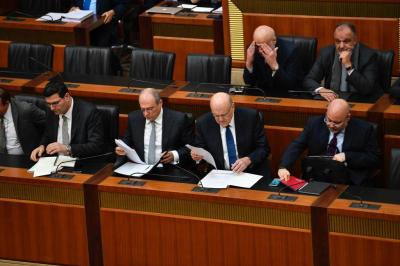Speaker Nabih Berri has adjourned the budget discussion session until 11:00 AM tomorrow, Thursday. The discussion session aimed at approving the 2024 budget in the Parliament had previously continued. Caretaker Prime Minister Najib Mikati stated that "the budget cannot be approved as a bill proposal but must come from the government as a draft law," and added that "we have no objection to adopting the improvements made by the Finance Committee on the budget draft."
In a statement from the Parliament, Mikati emphasized that "the government has halted the collapse since it took office, and the recovery phase has begun, hoping to grow with the assistance of the MPs, and most importantly, to reach the goal." Mikati also expressed a desire for "peace and lasting stability in the south and reiterated commitment to the implementation of resolution 1701 but insisted that 'Israel' must stop its violations."
MP Michel Daher expressed hope that "banks' secrecy will be lifted from MPs to understand the sources of waste and corruption to protect people's money," advocating for expanded administrative decentralization. He highlighted issues related to VAT collection, stating that "there are people not paying income tax and regions where VAT is not collected," thus calling for expanded financial decentralization as the only solution.
For his part, MP and head of the "Free Patriotic Movement" Gibran Bassil remarked on the lack of disagreement regarding the principle of passing the budget in the form proposed by the Finance and Budget Committee, pointing out constitutional chaos that allows the caretaker government to seize the powers of the President. Bassil stressed that "passing the budget is a fundamental aspect of legislative work, and the government has approved a catastrophic budget without vision or reform program." He articulated concerns regarding the factors creating turmoil in Lebanon, questioning the implications of not electing a president and coexisting with a vacuum, perceiving it as a demolition of the Taif Agreement and an attack on national partnership.
He addressed Speaker Nabih Berri, stating, "We will remain in the session if you accept our proposed law; otherwise, we will leave, and our committee president and members will stay behind to continue their technical work and vote against the budget."
In response to Bassil's remarks about necessary foundational laws and urgent legislation, Berri retorted that "the Strong Lebanon Bloc disrupted the urgent legislative session," adding, "It was you who boycotted the session that had the capital control on its agenda."
MP Ghada Ayoub from the "Strong Republic Bloc" commented on Bassil's statements during the budget discussion, stating, "The sorcerer has been turned against," referring to those who have disrupted matters now complaining about obstruction. She noted that those who contributed to undermining the constitution should not be addressing proposals for a budget law, describing it as the biggest blow to the Lebanese constitution in history. Ayoub saw the budget as indicative of the current authorities, having dismantled the separation between legislative and executive powers.
MP Ziad Hawat stated that the election of the president should have been a matter of the past, respecting constitutional deadlines, calling for a government that regains the decision of war and peace. He referred to the budget as a "déjà vu" and one that comprises merely a collection of figures without proper accountability. He challenged Berri to call for a session to elect a president until a resolution is reached, aiming to transition Lebanon from its current dire state to a strong republic.
MP Sajia Atiah described the prepared budget as good but not sufficient, emphasizing the need to reclaim Lebanese people's funds and develop an investment plan for national revival. He acknowledged Prime Minister Mikati's cooperation with all parties and affirmed the importance of arriving at solutions for the recovery of the country.
MP Ni'mat Afra, on his part, announced that he would vote for the budget as it provides a starting point, underscoring that it has been stagnant for five years and has a distinct social aspect. He mentioned the necessity of addressing state employees' grievances and suggested amending VAT exemptions, recognizing it may not be popular but essential.
MP Wael Abu Faour stressed during the evening session the need for a tax evasion combat plan, noting that an increase in value-added tax would affect prices. Mikati, upon leaving the budget discussion session, remarked that "the discussion today transformed from a budget examination into a general discussion about national policies, which we consider enriching for the government to correct any errors, as no one is infallible." He expressed satisfaction with the ongoing parliamentary debate as it aims to revive the nation following various crises. He reiterated that the government had halted the ongoing collapse and commenced a recovery phase, hoping for further development with the assistance of lawmakers.
In response to inquiries about signing decrees, he stated that "there is a decision from the Constitutional Council and the Consultative Council, and the Prime Minister represents the government." On Bassil's proposed law for budget approval, he labeled it a "novelty," maintaining that the budget cannot be approved via a legislative proposal but must originate from the government as a bill, noting that the government’s draft did not include new taxes or fees, only adjustments for the inflation that had occurred.
Regarding his political campaign, he emphasized his desire for "permanent peace and stability in the south," reiterating commitment to complying with resolution 1701 and all international agreements, while insisting that Israel must cease its violations.




